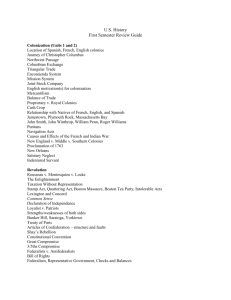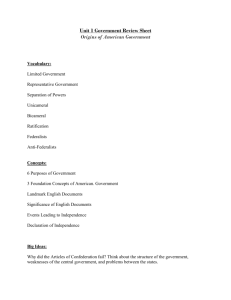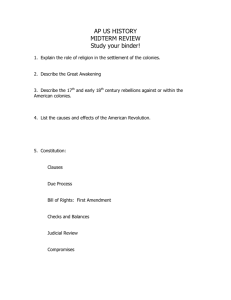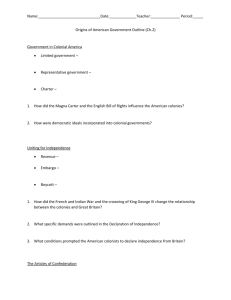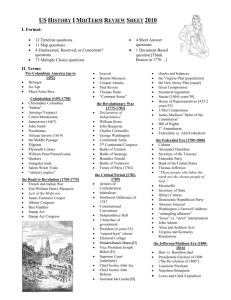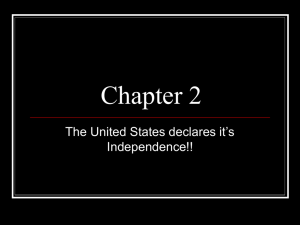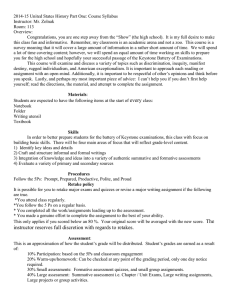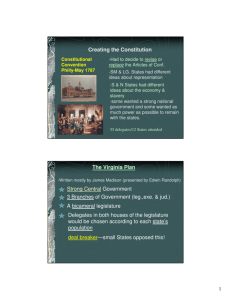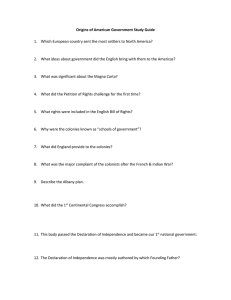Honors U.S. History First Semester Review Guide Colonization
advertisement
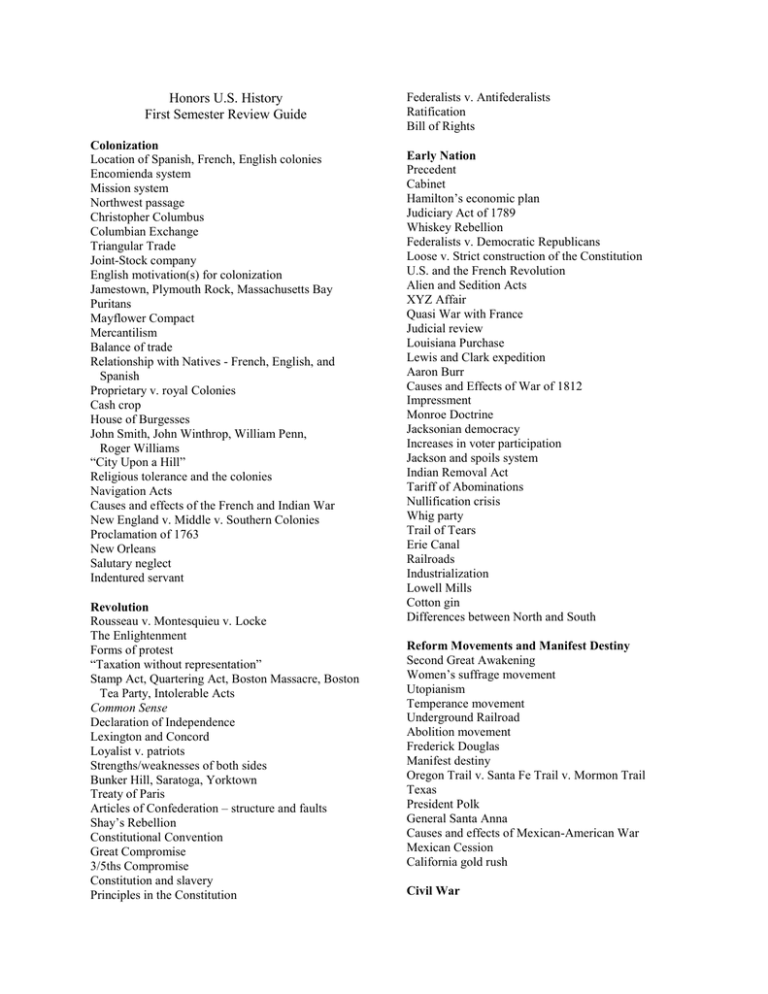
Honors U.S. History First Semester Review Guide Colonization Location of Spanish, French, English colonies Encomienda system Mission system Northwest passage Christopher Columbus Columbian Exchange Triangular Trade Joint-Stock company English motivation(s) for colonization Jamestown, Plymouth Rock, Massachusetts Bay Puritans Mayflower Compact Mercantilism Balance of trade Relationship with Natives - French, English, and Spanish Proprietary v. royal Colonies Cash crop House of Burgesses John Smith, John Winthrop, William Penn, Roger Williams “City Upon a Hill” Religious tolerance and the colonies Navigation Acts Causes and effects of the French and Indian War New England v. Middle v. Southern Colonies Proclamation of 1763 New Orleans Salutary neglect Indentured servant Revolution Rousseau v. Montesquieu v. Locke The Enlightenment Forms of protest “Taxation without representation” Stamp Act, Quartering Act, Boston Massacre, Boston Tea Party, Intolerable Acts Common Sense Declaration of Independence Lexington and Concord Loyalist v. patriots Strengths/weaknesses of both sides Bunker Hill, Saratoga, Yorktown Treaty of Paris Articles of Confederation – structure and faults Shay’s Rebellion Constitutional Convention Great Compromise 3/5ths Compromise Constitution and slavery Principles in the Constitution Federalists v. Antifederalists Ratification Bill of Rights Early Nation Precedent Cabinet Hamilton’s economic plan Judiciary Act of 1789 Whiskey Rebellion Federalists v. Democratic Republicans Loose v. Strict construction of the Constitution U.S. and the French Revolution Alien and Sedition Acts XYZ Affair Quasi War with France Judicial review Louisiana Purchase Lewis and Clark expedition Aaron Burr Causes and Effects of War of 1812 Impressment Monroe Doctrine Jacksonian democracy Increases in voter participation Jackson and spoils system Indian Removal Act Tariff of Abominations Nullification crisis Whig party Trail of Tears Erie Canal Railroads Industrialization Lowell Mills Cotton gin Differences between North and South Reform Movements and Manifest Destiny Second Great Awakening Women’s suffrage movement Utopianism Temperance movement Underground Railroad Abolition movement Frederick Douglas Manifest destiny Oregon Trail v. Santa Fe Trail v. Mormon Trail Texas President Polk General Santa Anna Causes and effects of Mexican-American War Mexican Cession California gold rush Civil War Missouri Compromise v. Compromise of 1850 v. Kansas-Nebraska Act Popular sovereignty Steven Douglas John Brown Bleeding Kansas Fugitive Slave Act Dred Scott decision Election of 1860 Fort Sumter Advantages and disadvantages of North and South Plans for North and South Emancipation Proclamation Antietam, Gettysburg, Sherman’s March to the Sea, Vicksburg, Appomattox Court House Total war Why the North won Reconstruction Civil War amendments Reconstruction plans Impeachment of Andrew Johnson Freedman’s Bureau KKK Sharecropping Black Codes Jim Crow Laws Limits on voting for African Americans Carpetbagger v. Scalawag Robert E. Lee v. Ulysses S. Grant Jefferson Davis End of Reconstruction Gilded Age Causes of the Indian Wars Sand Creek Massacre, Little Big Horn, Wounded Knee Gov’t policy towards Natives: Assimilation & Dawes Act Transcontinental Railroad Capitalism v socialism Entrepreneur Laissez-faire Electricity, communication, steel Effects of industrialization Corporation John D. Rockefeller, Cornelius Vanderbilt, Andrew Carnegie, George Pullman Horizontal v. vertical integration Robber Barons v. Captains of Industry Social Darwinism Sherman Anti-trust Act Company towns Collective bargaining Knights of Labor v. American Federation of Labor Major labor strikes New v. old immigrants Push v. pull factors Ellis v. Angel Island Americanization programs Nativism Chinese Exclusion Act Urbanization – positive and negatives Tenements Gilded Age Monopoly v. cartel v. trust There will be maps! All major presidents discussed in class are free game!
